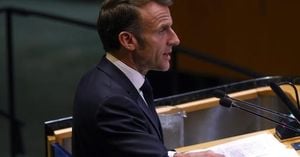As coalition negotiations between Germany's Social Democratic Party (SPD) and the Union (CDU/CSU) intensify, key points of contention about tax increases are emerging. Recently, the SPD proposed increasing the rich tax rate to as much as 49% as part of a deal that would simultaneously offer tax cuts for individuals with lower and middle incomes. This new proposal marks an increase from a previous campaign promise of 45%, raising concerns and objections from Union leaders.
The SPD's plans come at a time when the political landscape is charged, particularly as negotiations regarding a coalition agreement must be finalized by early April. Reports suggest that the agitation around these negotiations is not merely about tax rates but reflects deeper ideological divisions regarding fiscal policy in Germany.
According to a report by Bild, "Die SPD will, einem Bericht zufolge im Gegenzug für Steuersenkungen für Menschen mit kleinen und mittleren Einkommen den Reichensteuersatz auf bis zu 49 Prozent anheben." Such an increase aims to address the financial needs of the middle and lower classes by redistributing wealth, a move the SPD argues is necessary.
However, the strategy has not been met with unanimous support. The Union has made it clear that they oppose the significant tax hikes proposed by the SPD, citing potential negative impacts on the economy. The tension between the two parties hints at a larger struggle, as CDU leader Friedrich Merz stated that any financial policy decisions must be responsible and protect the economic interests of all Germans.
Moreover, the proposed adjustments extend to the Spitzensteuersatz (top tax rate), which is expected to rise from 42% to 47%. This fall in line with the SPD’s broader agenda to rework Germany's tax structure further ignites debates between the coalition partners about economic management.
In light of these discussions, sources reveal that the SPD is emphasizing the need for a tax reform that is "mindestens aufkommensneutral" (at least revenue-neutral). This approach means they aim to offset higher taxes on the wealthy with meaningful cuts for the broader population, trying to strike a balance between social equity and economic growth.
The negotiations have also been disruptive within the Union itself, as various local representatives express dissatisfaction with Merz's handling of fiscal issues. As tensions rise, the CDU city association in Kühlungsborn has noted a mass resignation of its members in protest over perceived failures in economic policy. This could signify a growing rift and dissatisfaction among party ranks, particularly relating to the handling of budgetary and tax issues.
As the discussions continue, conflicting priorities emerge—while the SPD pushes for increased taxation on wealthier individuals to support social welfare, the Union stands firm against increases that they fear would stifle economic growth. Observers note that without finding common ground, these negotiations could falter.
Beyond tax discussions, there is an urgent backdrop of broader governmental reforms requiring attention. Chancellor Olaf Scholz received his dismissal papers from Federal President Frank-Walter Steinmeier, yet the previous administration remains operational until the new government is officially established. Scholz has acknowledged the need for continued discussions to address the pressing issues facing the nation.
Amidst these tensions, the urgency for both parties to reach an agreement becomes paramount. The coalition's success hinges not just on tax rates but on the ability of both sides to unify their platforms and outline a cohesive agenda for Germany’s future. Such unity is seen as essential, especially as Germany navigates challenges on multiple fronts including economic stability, international relations, and domestic policies.
The negotiations will continue, with major developments expected as leaders from both parties prepare to meet and deliberate further on the contentious issues at stake—most notably, the proposed tax increases aimed at wealthier citizens that spark fierce debate on economic strategy and social responsibility within Germany.








